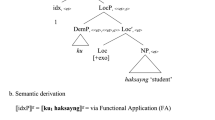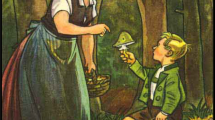Abstract
Roman Jakobson, who had left Russia in 1920 and in 1941 took refuge in the USA from the Nazis, was one of the main figures in post war linguistics and structuralism. Two aspects of his work are examined in this article. Firstly, Jakobson purifies his linguistic theory of pragmatic references. Secondly, he develops his own diplomatic mission of mediating between East and West. In this article, I argue that these two aspects did not develop independently from one another. Instead I claim that his theory is designed to slip through the Iron Curtain, while at the same time providing the means to analyse ways of acting politically by using language. This argument is unfolded in two steps, each consisting of two parts. First, I compare the theory of pronominal expressions as developed by Emil Benveniste to Jakobson’s theory of shifters. While Benveniste focuses on the relation of language and its subject using language, Jakobson introduces a model of communication to allow maximal formalisation of language. According to this even the category of person can be freed from its reference to a subject which would be understood as having a place in space and time. Then, Jakobson’s theory of shifters is studied in relation to his analyses of poetry. For this, two examples are chosen: Jakobson’s text on two poems by Russian poet Alexandr Blok, and his text on a poem by Bertold Brecht. In both texts, the theory of shifters—and the alleged purification from pragmatic aspects of language use ensuing from this theory—is challenged by the simple fact that they focus on the pronoun of the first person plural. According to Jakobson, the category of number does not belong to the shifters. Rather, number quantifies participants of the related event. The pronoun ‘we’ is at the same time a shifter and a non-shifter, as it refers to the speech event and the related event. Thus the pronoun ‘we’ opens up the possibility to include or exclude the participants of a communicative situation, and thereby enables the speaker to act socially or even politically by using language. The article concludes by coming back to the historical situation in which Jakobson developed his analyses of poetry. Analysing poetry seems to have been a passe-partout for him, a seemingly harmless subject that allowed him to get a foot in the door of remote and secluded lecture halls.
Similar content being viewed by others
Notes
Jakobson 1971a includes an editorial note mentioning the context in which it came to be written: “Prepared in Cambridge, Mass., 1956, for the Project ‘Description and Analyses of Contemporary Standard Russian’” (p. 146).
Benveniste 1956.
Jakobson 1971a, p. 131.
See, for instance, Waugh 1976, particularly p. 24.
Jakobson 1971a, p. 130.
Jakobson and Pomorska 1983, p. 76.
Jakobson and Pomorska 1983, p. 77.
In this sense Jakobson was both present in and absent from the Soviet Union. He enjoyed a broad, intense and even sustained reception according to Gamkrelidze/Elizarenkova/Ivanov (1976); however no edition of Jakobson’s writings was published in the Soviet Union. Igor' Mel'čuk failed in his attempt to publish a collection of Jakobson’s writings in Russian translation at the end of the 1960s. “RJ returned to Russia” (Mel'čuk 1976) only when, in 1985, a selection of his work was finally published in Russian.
Benveniste (1971) p. 219.
Benveniste, op. cit., p. 220.
Benveniste, op. cit., p. 219.
Benveniste (1956) p. 34.
Benveniste (1971) p. 217.
Benveniste 1971, p. 218.
See Benveniste 1971, p. 218.
Benveniste 1971, p. 219.
Benveniste 1971, p. 218.
First published in Journal de Psychologie, juillet-septembre 1958.
Benveniste 1971, p. 224.
Benveniste 1971, p. 226.
Benveniste 1971, p. 226.
Jakobson 1971a, p. 132.
Jakobson 1971a, p. 130.
Jakobson 1971a, p. 130.
Jakobson 1971b, pp. 558f.
See Fehr 1999, p. 1.
In the case of Roman Jakobson, Gerovitch lists the following replacements: “Instead of Ferdinand de Saussure’s opposition langue and parole, Jakobson began using code and message; he substituted subcodes for styles, and replaced contextual variations with redundant features; encoding and decoding supplanted production and comprehension; and speaker and listener became encoder and decoder.” (Gerovitch 2002, p. 92).
Cf. Shannon and Weaver 1949, p. 44.
See Gerovitch 2002.
Jakobson 1971a, p. 133.
Jakobson 1971a, p. 134.
Lyons 1968, p. 277.
Jakobson 1971a, p. 134.
Jakobson 1971c, p. 9.
Benveniste 1971, p. 217.
Foucault 1972, p. 92.
Foucault 1972, p. 92.
Foucault 1972, p. 95.
Foucault 1972, p. 95.
Cf. Foucault 1984: “[…] a text always bears a number of signs that refer to the author. Well known to the grammarians, these textual signs are personal pronouns, adverbs of time and place, and the conjugation of verbs.”
Foucault 1984, p. 101.
The similarity between The Archaeology of Knowledge and Benveniste’s writings has been established by Agamben 2002, p. 137ff.
Foucault 1989, p. 9f.
Foucault 1989, p. 11.
Jakobson 1981c, p. 88.
Jakobson is quoting Edward Sapir, Language (New York, 1921), p. 89. See Jakobson 1981c, p. 88.
Jakobson 1981c.
Foucault 1972, pp. 227–228 (“The Discourse on Language”).
Quoted in Jakobson 1981c, p. 95.
Jakobson 1981a, p. 567.
Foucault 1972, pp. 93–94.
Cf. Brecht 1998, p. 67.
Jakobson 1981b, p. 660.
Jakobson 1981b, p. 662.
Jakobson 1981b, p. 669.
Jakobson 1981b, p. 669.
Jakobson 1981b, p. 669.
Foucault 1972, p. 92.
Jakobson and Pomorska 1983, p. 77.
Jakobson 1981c, p. 89.
According to Vjačeslav Ivanov’s memoirs Jakobson saw himself as an academic diplomat (Ivanov 1999, p. 220).
Deleuze and Guattari 1987, p. 264f. Translation slightly changed by the editor.
References
Agamben, G. (2002). Remnants of Auschwitz: The Witness and the Archive. Cambridge: Zone Books.
Benveniste, E. (1956). La nature des pronoms. In M. Halle (Ed.), For Roman Jakobson. Essays on the Occasion of His Sixtieth Birthday, 11 October 1956. The Hague: Mouton.
Benveniste, E. (1971). Problems in general linguistics, 2 vols. Coral Gables, FL: University of Miami Press.
Brecht, B. (1977). The Measures Taken and other Lehrstücke. London: Methuen.
Brecht, B. (1998). Die Maßnahme. Zwei Fassungen. Frankfurt/M.: Suhrkamp.
Corbett, G. G. (2000). Number. Cambridge textbooks in linguistics. Cambridge: Cambridge University Press.
Daston, L., & Galison, P. (2007). Objectivity. New York: Zone Books.
Deleuze, G., & Guattari, F. (1987). A thousand plateaus. Capitalism and schizophrenia. Minneapolis: University of Minnesota Press.
Fehr, J. (1999). Der ‘Code’ (in) der Sprachwissenschaft. Zur Geschichte eines Konzepts. Lecture given on 6 January 1999 at the University of Bern. http://people.collegium.ethz.ch/~jfehr/02-03/Code.pdf. Cited 10 Dec 2009.
Foucault, M. (1972). The archaeology of knowledge and the discourse on language. New York: Pantheon Books.
Foucault, M. (1984). What is an Author? In P. Rabinow (Ed.), The foucault reader (pp. 101–120). New York: Pantheon Books.
Foucault, M. (1989). Maurice Blanchot. In Foucault/Blanchot (Ed.), The thought from outside (pp. 7–59). New York: Zone Books.
Gamkrelidze, T. V., Elizarenkova, T. Ja., Ivanov, Vj. Vs. (1977). Лингвиcтичecкaя тeopия P. O. Якoбcoнa в paбoтax coвeтcкиx лингвиcтoв. In D. Armstrong & C. H. van Schooneveld (Eds.), Roman Jakobson. Echoes of his scholarship (pp. 91–121). Lisse: Ridder.
Gerovitch, S. (1999). Speaking cybernetically: The Soviet remaking of an American science. Ph.D. dissertation. Program in Science, Technology and Society, MIT.
Gerovitch, S. (2002). From newspeak to cyberspeak. A history of soviet cybernetics. Cambridge, MA: MIT Press.
Ivanov, Vj. Vs. (1999). Бypя нaд Hьюфayндлeндoм. Из вocпoминaний o Poмaнe Якoбcoнe. In H. Baran, et al. (Eds.),
 (pp. 219–253). Mocквa: Издaтeльcкий цeнтp PГГУ.
(pp. 219–253). Mocквa: Издaтeльcкий цeнтp PГГУ.Jakobson, R. (1971a). Shifters, verbal categories, and the Russian verb. In R. Jakobson (Ed.), Selected writings II. Word and language (pp. 130–147). The Hague, Paris: Mouton.
Jakobson, R. (1971b). Results of a joint conference of anthropologists and linguists. In R. Jakobson (Ed.), Selected writings II. Word and language (pp. 554–567). The Hague, Paris: Mouton.
Jakobson, R. (1971c). Zur Struktur des russischen Verbums. In R. Jakobson (Ed.), Selected writings II. Word and language (pp. 3–15). The Hague, Paris: Mouton.
Jakobson, R. (1981a). Cтиxoтвopныe пpopицaния Aлeкcaндpa Блoкa. In S. Rudy & R. Jakobson (Eds.), Selected Writings III. Poetry of grammar and grammar of poetry (pp. 544–567). The Hague, Paris: Mouton, de Gruyter.
Jakobson, R. (1981b). Der grammatische Bau des Gedichts von B. Brecht ‘Wir sind sie’. In S. Rudy & R. Jakobson (Eds.), Selected Writings III. Poetry of Grammar and Grammar of Poetry (pp. 660–676). The Hague, Paris: Mouton, de Gruyter.
Jakobson, R. (1981c). Poetry of Grammar and Grammar of Poetry. In S. Rudy & R. Jakobson (Eds.), Selected Writings III. Poetry of Grammar and Grammar of Poetry (pp. 87–97). The Hague, Paris: Mouton, de Gruyter.
Jakobson, R. (2007a). Lyrische Prophezeiungen Aleksandr Bloks. In R. Jakobson, S. Donat, & H. Birus (Eds.), Poesie der Grammatik und Grammatik der Poesie Sämtliche Gedichtanalysen (pp. 453–491). Berlin, New York: de Gruyter.
Jakobson, R. (2007b). Der grammatische Bau des Gedichts von B. Brecht ‘Wir sind sie’. In R. Jakobson, S. Donat, & H. Birus (Eds.), Poesie der Grammatik und Grammatik der Poesie. Sämtliche Gedichtanalysen (pp. 687–716). Berlin, New York: de Gruyter.
Jakobson, R., & Pomorska, K. (1983). Dialogues. Cambridge, MA: MIT Press.
Kay, L. E. (2000). Who wrote the book of life. Stanford, CA: University of Stanford Press.
Lyons, J. (1968). Introduction to theoretical linguistics. Cambridge: Cambridge University Press.
Mel’čuk, I. A. (1995). Roman Jakobson and Studies of the Russian Language. In I. A. Mel’čuk (Ed.) Russkij jazyk v modeli “mysl ↔ tekst” (pp. 595–608). Moscow et al.: Шкoлa “языки pyccoй кyльтypы”.
Rudy, St. (1999a). Jakobson during McCarthyism. In H. Baran, et al. (Eds.),
 (pp. 192–200). Mocквa: Издaтeльcкий цeнтp PГГУ.
(pp. 192–200). Mocквa: Издaтeльcкий цeнтp PГГУ.Rudy, St. (1999b). Roman Jakobson: A Chronology. In H. Baran, et al. (Eds.),
 (pp. 83–103). Mocквa: Издaтeльcкий цeнтp PГГУ.
(pp. 83–103). Mocквa: Издaтeльcкий цeнтp PГГУ.Shannon, C. E., & Weaver, W. (1949). The mathematical theory of communication. Urbana: University of Illinois Press.
Waugh, L. R. (1976). Roman Jakobson’s Science of Language. Lisse: Ridder.
Acknowledgments
The author would like to thank the editors, an anonymous reviewer, Franziska Thun-Hohenstein and Armin Schäfer for helpful comments; the Max-Planck-Institute for the History of Science and the VolkswagenStiftung for support. Translated by Steph Morris.
Author information
Authors and Affiliations
Corresponding author
Rights and permissions
About this article
Cite this article
Kursell, J. First person plural: Roman Jakobson’s grammatical fictions. Stud East Eur Thought 62, 217–236 (2010). https://doi.org/10.1007/s11212-010-9115-x
Published:
Issue Date:
DOI: https://doi.org/10.1007/s11212-010-9115-x





 (pp. 219–253). Mocквa: Издaтeльcкий цeнтp PГГУ.
(pp. 219–253). Mocквa: Издaтeльcкий цeнтp PГГУ. (pp. 192–200). Mocквa: Издaтeльcкий цeнтp PГГУ.
(pp. 192–200). Mocквa: Издaтeльcкий цeнтp PГГУ. (pp. 83–103). Mocквa: Издaтeльcкий цeнтp PГГУ.
(pp. 83–103). Mocквa: Издaтeльcкий цeнтp PГГУ.